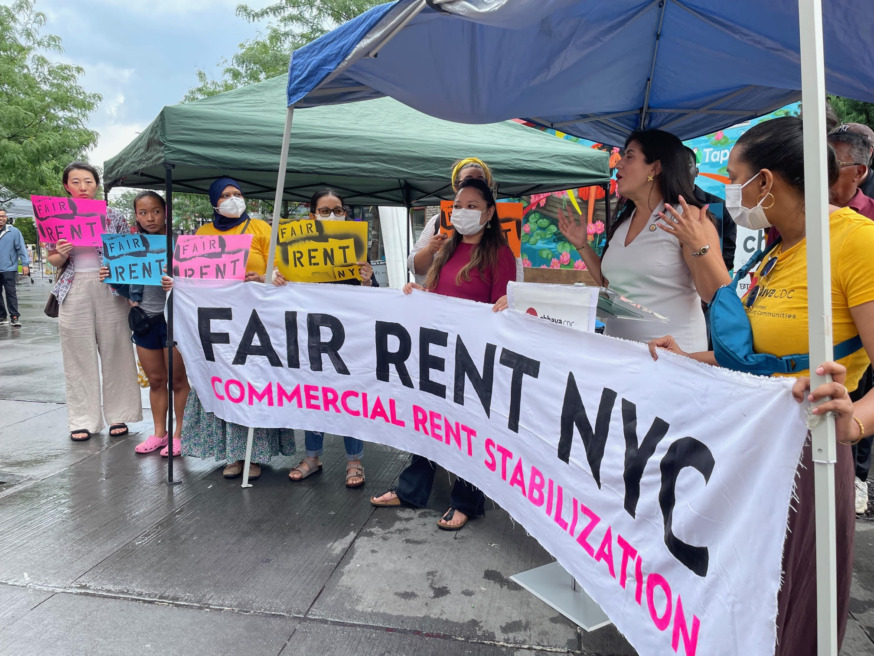
State Senator Jessica Ramos expresses solidarity with Queens business owners who are burdened by rising rents. (Photo courtesy of Fair Rent NYC)
June 15, 2023 By Bill Parry
Small business owners and advocates from across Queens rallied with elected officials on Diversity Plaza in Jackson Heights on June 14 to highlight the challenges that excessive rent hikes are creating in neighborhoods throughout the borough.
The merchants accused “predatory landlords” of doubling and tripling commercial rents that have displaced small businesses while exacerbating gentrification for decades.
“Keeping our local commercial corridors vibrant with small businesses is good for public safety and it’s good for the economy,” state Senator Jessica Ramos said. “It’s not just working families who are feeling the pressure of rising rent, small business owners are feeling it too. The best way to support entrepreneurial New Yorkers is to lift the burden of one of their most significant expenses with commercial rent stabilization. That money can go back into growing their business and paying livable wages to their employees.”
She urged the City Council to pass Intro 93 to finally establish commercial rent stabilization rules that would strengthen the small business community.
“We stand in solidarity with immigrant small businesses, the vibrant heart of our communities, and vehemently oppose any rent increases that threaten their livelihoods,” Councilman Shekar Krishnan said. “These businesses have already overcome countless obstacles to contribute to our economy, and we must ensure they have a fair and stable environment to thrive. Commercial rent stabilization will protect the aspirations of our immigrant entrepreneurs and the vitality they bring to our neighborhoods.”
Small businesses and nonprofits that rallied at Diversity Plaza said they were there to support New Yorkers who were impacted during the worst months of the pandemic and are now struggling even more to plan for their future with inflation, minimum wage increases and the added handicap of back-rent and other accrued debt.
“While there is a narrative that the pandemic caused a drop in commercial rents, that’s a story focused on office buildings in midtown Manhattan,” said Sonia Kaur, owner of Didi Dukan, a clothing shop on 74th Street in Jackson Heights. “That isn’t what’s happening in Jackson Heights. Rents keep going up. Since I opened just before the pandemic, my rent has gone up almost 40%. My rent used to be affordable. I paid $6,500 when I opened and it’s now almost $9,000. I don’t know what the landlord is going to charge me with my next lease. I am worried that I’ll have to close my business. We need a commercial rent stabilization system or businesses like mine will have to close.”
Tsering Sherpa, the owner of Pema Nails in Astoria for the past 23 years, agreed.
“As a business owner, I should have a predictable rent increase. I shouldn’t have to invest in my business, to stay compliant with laws, have a safe space for my staff and not know if I’ll even be open next year,” Sherpa said. “I have a very small space and I pay $4,050 in rent each month plus $3,500 per year in property taxes for a space that I don’t even own. My lease expires next year. My landlord has already been increasing my rent.
“I’m very anxious about what can happen. My landlord owns the space next door and just two months ago the grocery store there had to close because they couldn’t afford the rent they charged,” Sherpa continued. “I am afraid my landlord can increase the rent for my nail salon knowing that a Starbucks or a pharmacy will move in and pay the rent if I can’t. Our City Council needs to act now. Pass Intro 93 to build a commercial rent stabilization model.”
Jenny Dabnau of the Western Queens Community Land Trust blamed the “unconscionably high” commercial rents for contributing to gentrification and displacement in neighborhoods across the borough.
“We are losing our beloved restaurants, bookstores, and hardware stores in favor of chain shops and empty storefronts,” Dabnau said. “And how many local jobs are lost when local businesses are forced to close? Locally-owned stores provide local jobs, and so do manufacturers and cultural working spaces, which are often located in industrial zones. It’s only common sense to pass Commercial Rent Stabilization now.”





